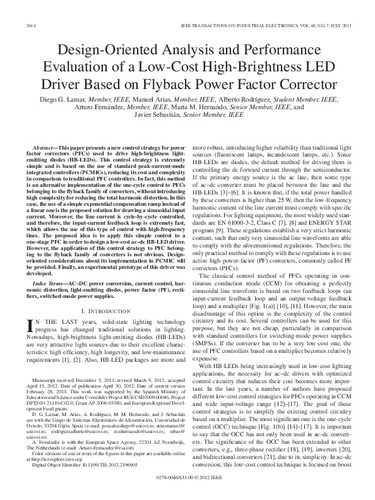Design-oriented analysis and performance evaluation of a low-cost high-brightness LED driver based on flyback power factor corrector
Palabra(s) clave:
Compensation
Driver circuits
Feedback
Harmonic distortion
Fecha de publicación:
Editorial:
Institute of Electrical and Electronics Engineers Inc. (IEEE)
Versión del editor:
Citación:
Descripción física:
Resumen:
This paper presents a new control strategy for power factor correctors (PFCs) used to drive high-brightness light-emitting diodes (HB-LEDs). This control strategy is extremely simple and is based on the use of standard peak-current-mode integrated controllers (PCMICs), reducing its cost and complexity in comparison to traditional PFC controllers. In fact, this method is an alternative implementation of the one-cycle control to PFCs belonging to the flyback family of converters, without introducing high complexity for reducing the total harmonic distortion. In this case, the use of a simple exponential compensation ramp instead of a linear one is the proposed solution for drawing a sinusoidal input current. Moreover, the line current is cycle-by-cycle controlled, and therefore, the input-current feedback loop is extremely fast, which allows the use of this type of control with high-frequency lines. The proposed idea is to apply this simple control to a one-stage PFC in order to design a low-cost ac-dc HB-LED driver. However, the application of this control strategy to PFC belonging to the flyback family of converters is not obvious. Design-oriented considerations about its implementation in PCMIC will be provided. Finally, an experimental prototype of this driver was developed
This paper presents a new control strategy for power factor correctors (PFCs) used to drive high-brightness light-emitting diodes (HB-LEDs). This control strategy is extremely simple and is based on the use of standard peak-current-mode integrated controllers (PCMICs), reducing its cost and complexity in comparison to traditional PFC controllers. In fact, this method is an alternative implementation of the one-cycle control to PFCs belonging to the flyback family of converters, without introducing high complexity for reducing the total harmonic distortion. In this case, the use of a simple exponential compensation ramp instead of a linear one is the proposed solution for drawing a sinusoidal input current. Moreover, the line current is cycle-by-cycle controlled, and therefore, the input-current feedback loop is extremely fast, which allows the use of this type of control with high-frequency lines. The proposed idea is to apply this simple control to a one-stage PFC in order to design a low-cost ac-dc HB-LED driver. However, the application of this control strategy to PFC belonging to the flyback family of converters is not obvious. Design-oriented considerations about its implementation in PCMIC will be provided. Finally, an experimental prototype of this driver was developed
ISSN:
Ficheros en el ítem





